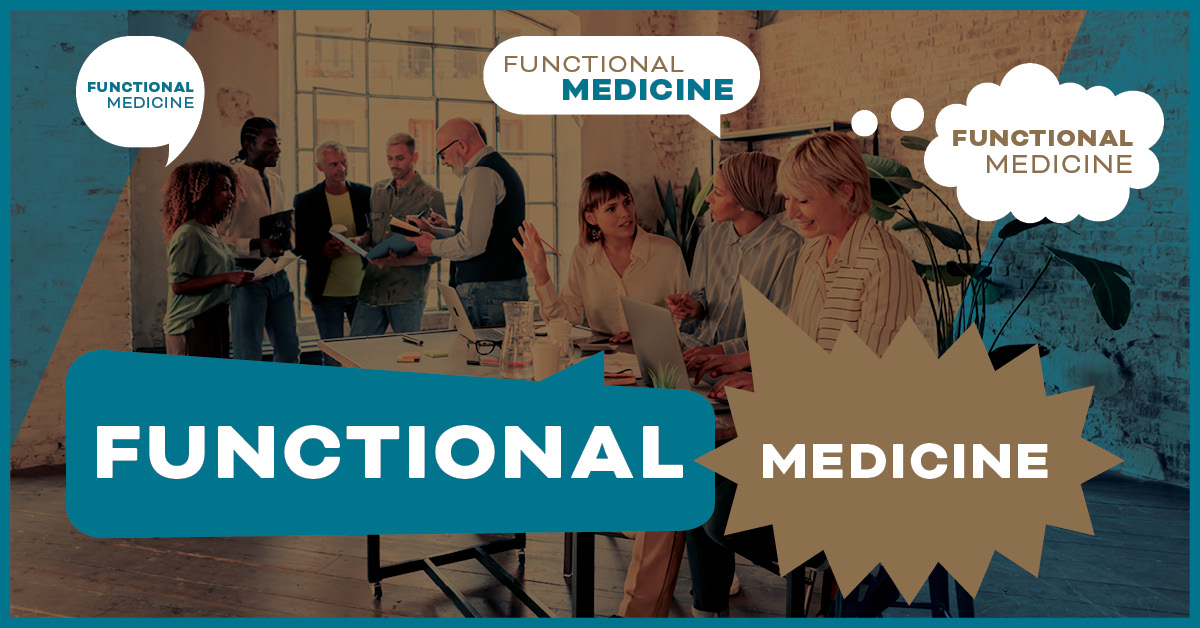
As part of my commitment, I completed the requirements to become a Certified Functional Medicine Practitioner (that’s the CFMP after my name). While “functional medicine” has recently become a bit of a buzz word, the concept is something I’ve built my practice on from day one.
What is functional medicine?
According to the Institute for Functional Medicine, functional medicine determines how and why illness occurs, and restores health by addressing the root causes of disease. Through this individualized, patient-centered, science-based approach, patients and practitioners collaborate in addressing the underlying causes of disease and promoting optimal wellness.
That’s exactly what I do with my patients every day! I truly believe that by taking an integrative functional medicine approach, we can get to the “root cause” of disease, and actually fix health problems instead of just covering them up. And even more importantly, we can get you feeling, looking and living your best.
5 functional medicine differences
Functional medicine and allopathic medicine (aka conventional or Western medicine) are two distinct approaches to caring for patients. The goal for both is to diagnose, treat and prevent illnesses. However, they differ in how they go about this. For example:
| Allopathic medicine | Functional medicine |
| Focuses on diagnosing and treating specific diseases or symptoms primarily using prescription drugs, surgery and other interventions. The main goal is managing and alleviating symptoms. | Aims to identify and address the root causes of health issues, which will then help with symptoms. Practitioners see the body as an interconnected system where imbalances in one area can affect other areas. The goal is to understand the underlying dysfunctions and support the body’s natural healing processes. |
| Primarily uses standardized diagnostic tests and procedures to identify specific diseases or conditions. | Uses traditional diagnostic tools while also gaining a comprehensive understanding of a patient’s medical history, lifestyle, genetics and environment. |
| Treatment often involves the use of prescription drugs, surgeries and other interventions to manage or suppress symptoms. | Treatment focuses on addressing underlying imbalances and promoting the body’s own healing abilities through personalized lifestyle changes, nutrition, supplements, stress management and other non-pharmaceutical interventions (although prescription medications are sometimes called for). |
| Tends to be more disease-centered and focused on the specific illness, condition or symptoms. | Focuses on patient-centered care, spending time to understand the patient’s unique circumstances, lifestyle and goals, and creating personalized treatment plans. |
| Excels in acute and emergency care, as well as managing chronic conditions that require pharmaceutical interventions. | Effective in identifying and addressing the root cause of chronic and complex health issues, often leading to better long-term outcomes. |
It’s important for me to acknowledge that both approaches have their strengths and weaknesses, and they are not necessarily mutually exclusive. For example, in my practice, we consider both functional and allopathic options depending on my patients’ needs, giving them the best of both worlds!
How functional medicine can help
Functional medicine can benefit patients experiencing a wide range of health conditions. Some of the health concerns I work with my patients on include:
- Gut health such as irritable bowel syndrome (IBS), inflammatory bowel disease (IBD), acid reflux and food sensitivities.
- Hormonal imbalances including thyroid disorders, adrenal fatigue, polycystic ovary syndrome (PCOS) and menopause-related symptoms
- Autoimmune diseases like rheumatoid arthritis, multiple sclerosis (MS) and lupus
- Chronic fatigue and low energy
- Metabolic disorders, such as diabetes, metabolic syndrome and obesity
- Cardiovascular health
- Mental health and mood disorders including depression, anxiety and attention deficit hyperactivity disorder (ADHD)
- Chronic pain and inflammatory conditions, such as fibromyalgia and arthritis
- Allergies and immune system support
- Skin issues like eczema, psoriasis and acne
- Insomnia and sleep disorders
- Neurological conditions such as migraines, neuropathies and cognitive decline
- Detoxification and environmental toxicity
While functional medicine isn’t a replacement for emergency medical care or treatment of acute and life-threatening conditions, it is an effective approach to get to the bottom of chronic and complex health concerns, and help patients feel and perform their best, rather than just covering up symptoms.
If you’d like to explore if functional medicine can help you reach YOUR health goals, please get in touch. I’m seeing patients at Evoke 5, my functional medicine clinic in Oklahoma City, as well as offering online consultations for clients across the country.
